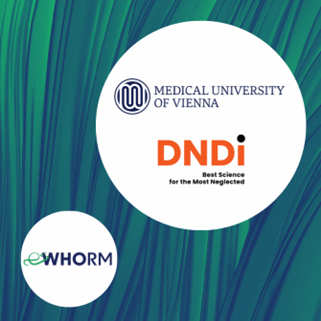Two-Week Research Visit: Thaddaeus Egondi, DNDi Eastern Africa, Kenya at the Institute of Medical Statistics, Vienna Medical University
DNDi and MUW: a research visit strengthens eWHORM’s mutual capacity in adaptive trial design and data standards
Purpose and Overview
In June 2025, eWHORM’s partner Medical University of Vienna (MUW), hosted a two-week visit by Thaddaeus Egondi, Senior Biostatistics Manager at the Drugs for Neglected Diseases initiative (DNDi), based in Nairobi, Kenya. The visit to the Institute of Medical Statistics at the MUW focused on collaboration, knowledge exchange, and skill-building in adaptive clinical trial design and data standards (WP2). Much of the work centered on the eWHORM project, with discussions on trial designs and analysis implementation. The visit also created space to explore possible future research partnerships and capacity-building initiatives. During the visit at the MUW, Thaddaeus interacted mainly with Prof. Martin Posch, Head of the Center for Medical Data Science and the Institute of Medical Statistics, and Dr. Sonja Zehetmayer, Associate Professor at the Center for Medical Data Science, as well as other researchers within the institute.
Activities and Achievements
Key highlights on achievements included in-depth discussions on adaptive designs rationale (WP2) and implementation and their role in improving decision-making during trials. Thaddaeus delivered a seminar on international data standards (CDISC) that supports transparency, efficiency, and global regulatory compliance. The visit provided opportunity for collaboration with the ‘R programming’ team, which helped refine the structure of analysis datasets, ensuring readiness for the trial’s outputs. In addition, discussions started on possible joint scientific publication on the use of adaptive designs in neglected tropical disease research and possible opportunities were identified for future training workshops and joint funding proposals.
Benefits and Added Value
This visit provided significant benefits beyond a remote exchange. The face-to-face interaction was invaluable for building rapport and trust, which is essential for effective collaboration on complex scientific topics. It was possible to have spontaneous, in-depth discussions that would have been difficult to replicate via email or video calls, allowing for a deeper understanding of each other's work and challenges. Thaddaeus Egondi explains:
The greatest benefit was gaining access to institute’s resources and receiving direct, timely feedback. Working side-by-side with the programming team, I quickly learned their coding approaches across different tools. This immediate feedback loop accelerated our timelines and ensured quick alignment of the outputs. What I enjoyed most was the opportunity to exchange ideas in a highly collaborative environment. The open and engaging discussions not only deepened my technical knowledge of adaptive designs but also inspired new ways of thinking about our own trial challenges. The opportunity to learn from world-class experts in a new cultural setting was also personally enriching.
On her side, Dr. Sonja Zehetmayer said:
It was a real pleasure to host Thaddaeus for his research stay—an enriching and enjoyable experience for our entire team. His talk on international data management with CDISC data standards attracted a large audience and sparked lively discussions. We look forward to future collaboration for eWHORM and related joint research projects to continue our discussions on innovative trial designs in NTDs.
Outcomes and Next Steps
The visit successfully initiated institutional ties and advanced preparations for the eWHORM project. It improved readiness for data management and analysis through CDISC-compliant approaches, deepened understanding of trial design and interim decision-making, and set in motion plans for a joint publication. The next steps include finalizing the manuscript outline, continuing with technical exchanges with the programming team, and holding a follow-up meeting in October 2025 to review progress and prepare for upcoming trial analyses.
